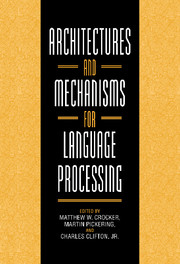Book contents
- Frontmatter
- Contents
- Contributors
- Preface
- 1 Architectures and Mechanisms in Sentence Comprehension
- Part I Frameworks
- Part II Syntactic and Lexical Mechanisms
- Part III Syntax and Semantics
- 9 On the Electrophysiology of Language Comprehension: Implications for the Human Language System
- 10 Parsing and Incremental Understanding During Reading
- 11 Syntactic Attachment and Anaphor Resolution: The Two Sides of Relative Clause Attachment
- 12 Cross-Linguistic Psycholinguistics
- Part IV Interpretation
- Author Index
- Subject Index
12 - Cross-Linguistic Psycholinguistics
Published online by Cambridge University Press: 03 October 2009
- Frontmatter
- Contents
- Contributors
- Preface
- 1 Architectures and Mechanisms in Sentence Comprehension
- Part I Frameworks
- Part II Syntactic and Lexical Mechanisms
- Part III Syntax and Semantics
- 9 On the Electrophysiology of Language Comprehension: Implications for the Human Language System
- 10 Parsing and Incremental Understanding During Reading
- 11 Syntactic Attachment and Anaphor Resolution: The Two Sides of Relative Clause Attachment
- 12 Cross-Linguistic Psycholinguistics
- Part IV Interpretation
- Author Index
- Subject Index
Summary
Introduction
Historically, most, if not all, of the research on sentence processing has been based on English. In recent years, however, several systematic studies of languages other than English have started. A natural question to ask is what are the reasons to study the processing aspects of languages other than English. The simple answer is to find out what the processing strategies are that the speakers of a specific language adopt. However, there can be two quite different views of psycholinguistics behind such an answer. One reason to do cross-linguistic studies might be the expectation that different languages show different processing strategies, under the assumption that processing strategies are a byproduct of the exposure to a given language. This view of cross-linguistic psycholinguistics implies that processing strategies are not universal, but rather language specific, and that therefore there is no need, at least in principle, to test the same strategy in different languages.
An alternative view of cross-linguistic psycholinguistics stems from the hypothesis that there are universal processing strategies that apply to all languages, because the processing strategies are independent of specific languages and are based on cognitive universals. Several processing strategies are based on such assumptions: Minimal Attachment and Late Closure (Frazier and Fodor, 1978), Right Association (Kimball, 1973), Superstrategy (Fodor, 1979), and the Active Filler Hypothesis (Frazier, 1987). In particular, the two cognitive needs on which the assumed universal parsing strategies are based are economy of derivation and economy of representation. These principles of economy in parsing are based on the limitation of human short term memory and the consequent need to structure the incoming material quickly and to use the fewest rules and simplest representation possible.
- Type
- Chapter
- Information
- Architectures and Mechanisms for Language Processing , pp. 282 - 300Publisher: Cambridge University PressPrint publication year: 1999
- 1
- Cited by



